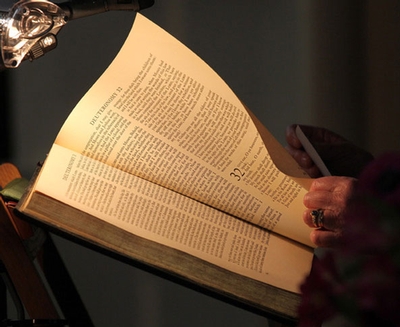 At around 3:45 in the morning of 5 March, I stood at the lectern of St Michael’s Without, in Bath, and read aloud a 17th-century translation of a 2,000-year-old reworking of a 3,000-year-old creation myth.
At around 3:45 in the morning of 5 March, I stood at the lectern of St Michael’s Without, in Bath, and read aloud a 17th-century translation of a 2,000-year-old reworking of a 3,000-year-old creation myth.
It was part of the “Bible Challenge” organised by the Bath Literature Festival to celebrate the 400th anniversary of the King James Bible.
People came from all over to read, taking turns, chapter by chapter. In the vigil hours between midnight and 5am, the organisers on the night shift just looked around the building, clocked who was there, and divvied it up.
I won.
I scored – it’s the only word for it – the first chapter of the Gospel according to John: In the beginning was the Word, and the Word was with God, and the Word was God.
To any recovering Papist, it still gets you in the solar plexus. Back in the day, every Mass ended with it: the “Last Gospel”. All knelt in ostensible awe at et verbum caro factum est – and the Word was made flesh – but for me the awe had already been and gone, in that first declamatory sentence.
It did not awaken my old faith. Nor was my ancestral Jewish blood stirred. Perhaps I had been hardened by my earlier chunks of the prophet and loony Hosea, full of ravings about prostitutes and clear signs from God so opaque that God then has to explain them. Wonderful stuff, but not designed to bring one weeping back to the synagogue or the bosom of Holy Mother Church.
Nor was it meant to. The idea was to celebrate the King James Bible as a literary work to be read aloud in public. One man came down from Glasgow specially, and scored the Ten Commandments for his pains. A proper bard, Ash the Rhymer, in dreadlocks and huge boots read with a passion and sincerity which can only spring from a profound engagement with language itself. An affable, schoolmasterly man got the genealogy of Joseph in Luke 3 (“Which was the son of Jesse, which was the son of Obed, which was the son of Booz,” etc. ad inf.) and read it dead straight, charmingly.
Some lucky bastard got the Song of Solomon.
But I got the first chapter of St John.
And I realised the strangest thing. I was terribly moved by what I was reading, and where, and by its provenance and the layers of history surrounding it, and by the organisers’ intentions and the diversity of people who came along to take part.
I was also profoundly struck by the evangelist’s proposition. He was not writing about the “Word”, but the original Greek logos, which means so much more. It carries connotations of laying out, picking up, ordering, organising, thinking and speaking. It is, if you like, a principle of organisation and expression, and the claim that this principle was coterminous with the beginning of time and indeed with the cosmos itself seemed all of a sudden alarmingly modern and alarmingly reasonable. Rather, in a sense, what science has been teaching for some time: a meticulous pursuit of the overarching logos of the natural world.
This, though, wasn’t the strangest thing. The strangest thing was that I found myself thinking: “But what will the humanists say? The rationalists? What will Hitchens and Dawkins and Grayling think if I say this in public?”
How odd that the very movement that I subscribe to and support, and that does so much to rid people of fear and superstition and walled-off thinking, should suddenly, in my mind, have taken on the form of an orthodoxy.
I know all the arguments and they are incontrovertible. I believe erroneous thinking is an absolute bad. I know that producing great art in the service of religion tells us nothing of the truth of religion itself, merely that men are often at their best when addressing something they believe to be bigger than, and outside of, themselves. That a humanist secular Bach would be inconceivable proves absolutely nothing.
Yet – and I am aware of the ratiodoxy’s disappointment in me as I type this – the only honest position statement I could sign right now would be “I am an atheist, but I do rather worry how God will take that,” and I do rather worry how the ratiodoxy will take that.
I’m not proposing “dual magisteriums” or mutually exclusive ontologies or any such illusionists’ tricks. But ... can there such a thing as a lapsed rationalist? Just a bit? And will Dawkins, Hitch and Grayling hunt me down?

